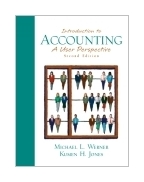Description
For Accounting Principles, Survey of Accounting, and 50/50 courses.
This introduction to accounting and its significant role in making sound business
decisions teaches students how to be wise users, not necessarily preparers of accounting
information-a strong user-based approach that's endorsed and supported by the AECC. The
authors present accounting information in a broader business context-emphasizing what
accounting information is, why it is important, and how it is used to make strategic
economic decisions-coverage of financial and management accounting included.
Contents
F1. Introduction to Business in the United States.
F2. Economic Decision Making.
F3. The Balance Sheet: Initial Financing-Investments by Owners.
F4. The Balance Sheet (Continued): Additional Financing-Borrowing from Others.
F5. Income Statement and Statement of Owners' Equity.
F6. Keeping Score: Bases of Economic Measurement.
F7. Accumulating Accounting Data.
F8. Challenging Issues Under Accrual Accounting: Long-Lived Depreciable Assets-A Closer
Look.
F9. Challenging Issues Under Accrual Accounting: Merchandise Inventory and Cost of Goods
Sold.
F10. The Balance Sheet and Income Statement: A Closer Look.
F11. Tools of the Trade Part III The Statement of Cash Flows: Bringing the Focus Back to
Cash.
F12. Financial Statement Analysis.
M1. Management Accounting: Its Environment and Future.
M2. Classifying Costs.
M3. Determining Costs of Products.
M4. Cost Behavior.
M5. Business Decisions Using Cost Behavior.
M6. Making Decisions Using Relevant Information.
M7. The Capital Budget: Evaluating Capital Expenditures.
M8. The Operating Budget.
M9. Standard Costing.
M10. Evaluating Performance.
1008 pages, Hardback
Features
User Approach. The Accounting Education Change Commission (AECC) has emphasized the
importance of understanding vs. rote memorization of procedures and vocabulary.
Jones/Werner focuses on all students-not just accounting majors-on the key concepts that
need to be learned not just for this course, but accounting material that will be critical
to their ability to make good business decisions.
Three Jones/Werner Text Options. The series includes separate financial and management
accounting texts or a comprehensive volume that combines the full content of the financial
and management texts.
Optional Debits & Credits. "Accumulating Accounting Data" is now covered in
Chapter 6 (Ch. 7 in previous edition), which introduces the accounting cycle and the
accounting procedures. Subsequent appendices to chapters 7-10 include coverage of debits
and credits for the topics contained in each chapter.
NEW - Improved Readability. Kumen Jones and Mike Werner have assumed key authorship of the
second edition. The second edition represents the most comprehensive revision to date.
And, Financial Chapter 1 now introduces all four statements!
NEW - Briefer Financial Text. The financial portion of the text is now only 11 chapters.
This edition consolidates Chapters 3 & 4 from previous edition into a single Chapter 3
on the balance sheet.
NEW - Integration of Financial Topics. Statement of Cash Flows and Key Financial Ratios
are introduced now in Chapter 3 and are integrated throughout the text where appropriate.
In-depth coverage of the direct method of the statement of cash flows is moved to an
appendix Financial statement analysis chapter presents charts for each of the 17 ratios
calculated for Pier 1 Imports and two peer companies.
Management Accounting Highlights
User-driven approach to cost behavior (Chs. 4-5).
Unique Chapter on Evaluating Performance (Ch. 10) discusses evaluation methods;
centralized and decentralized management styles, business segments, return on investment
and residual income; non-financial measures, such as quality, customer satisfaction,
employee morale, employee safety, efficiency, and just-in-time philosophy.
Distinctive presentation of the operating budget (Ch. 8). Part I describes the importance
and uses of the operating budget; compares/contrasts various approaches to preparation.
Part II shows step-by-step preparation of the budgets that comprise the operating budget;
details the use of the operating budget in the overall management process.
Assignment Options
NEW - Pier 1 Annual Report is bound with each text.
NEW - Revised Annual Report Project. Chapter 1 requires students to select a publicly
traded company and to obtain the company's Form 10K and annual report. The annual report
project requirements in later chapters are similarly supported by the text.
NEW - Apply What You Have Learned. These end-of-chapter assignment materials include a mix
of traditional types of homework problems and innovative assignments requiring critical
thinking and writing.
In-Text Discussion Questions. The unique Discussion Questions appear within the body of
the text and provide material for in-class group activities, whole-class discussions, and
writing assignments. They are designed to emphasize important textual points that students
may skip in their initial reading.
NEW - Review the Facts. These basic, definitional questions review the key points of each
chapter.
NEW - Revised Assignment Materials. The assignment material includes three categories of
assignments, each designed to help students understand the real-world applications of the
material: a) Continuous Annual Report Project b) Financial Reporting Exercises (these
encourage students to use the Internet, including the SEC's EDGAR system and Prentice
Hall's Companion Web site to link to real businesses and explore their financial
statements), and c) Accounting Cycle Cases (which can be used with the General Ledger
software) for a proprietorship, partnership, and a corporation.


